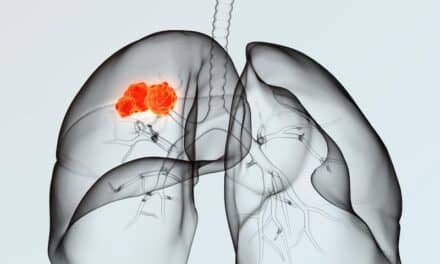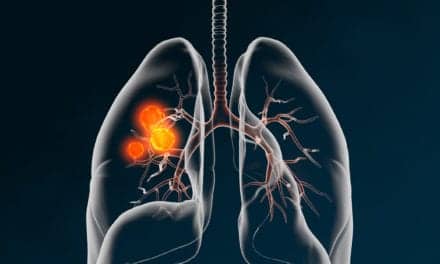Summary:
The FDA has approved Roche’s VENTANA MET (SP44) RxDx Assay, the first companion diagnostic to identify MET protein expression in lung cancer patients eligible for AbbVie’s targeted therapy EMRELIS.
Takeaways:
- The test enables more personalized treatment for advanced NSCLC patients by identifying MET protein overexpression.
- The FDA’s accelerated approval was based on promising results from the Phase 2 LUMINOSITY study, showing a 35% response rate.
- Lung cancer remains the leading cause of cancer deaths globally, with MET protein testing offering a new option for patients lacking EGFR mutations.
Roche has announced that the U.S. Food and Drug Administration (FDA) has approved the VENTANA MET (SP44) RxDx Assay, the first companion diagnostic approved to aid in determining MET (also known as c-Met) protein expression in NSCLC patients. These patients may now be eligible for treatment with AbbVie’s c-Met-targeted therapy EMRELIS (telisotuzumab vedotin-tllv). 2,3
“Understanding the molecular drivers in patients with non-small cell lung cancer is critical for therapy selection,” says Matt Sause, CEO of Roche Diagnostics. “By identifying MET protein expression at the appropriate stage in the patient journey, we can help provide timely, tailored treatment options that may improve patient outcomes and offer hope to those facing this challenging disease.”
Lung Cancer Remains Leading Cause of Cancer-Related Death
Despite advances in treatment, lung cancer remains the leading cause of cancer-related deaths in both men and women throughout the world. 4
Lung cancer is often diagnosed at an advanced stage when treatment options are limited; 5 median survival is less than one year.2 Approximately 85% of lung cancers are classified as NSCLC. 6 Among advanced NSCLC patients with a normal (wild-type) epidermal growth factor receptor (EGFR) gene, around a quarter exhibit high levels of MET protein, 7 making MET protein expression an important factor in determining treatment options for patients with this type of cancer .
Accelerated Approval
The FDA accelerated approval is supported by data from the Phase 2 LUMINOSITY study, an ongoing study designed to characterize the efficacy and safety of EMRELIS in c-Met overexpressing advanced NSCLC populations. Findings from the study showed patients with c-Met protein high expression who received EMRELIS demonstrated 35% overall response rate (ORR) and duration of response (DoR) with a median of 7.2 months. 8
The launch of the first immunohistochemistry (IHC) MET companion test exemplifies Roche’s commitment in this area, and represents an important addition to the company’s market-leading portfolio of immunohistochemistry (IHC) and in situ hybridization (ISH) companion diagnostics. These diagnostics are designed to provide critical insights that enable more informed clinical decisions, advancing personalized healthcare and improving patients’ lives.
Featured Image: Alexskopje | Dreamstime.com
References
1. Lee, M., et al. MET alterations and their impact on the future of non-small cell lung cancer (NSCLC) targeted
therapies. Expert Opinion on Therapeutic Targets, 25(4), 249–268 (2021).
2. Roche. VENTANA MET (SP44) RxDx Assay, US Package Insert. 2025.
3. Roche. VENTANA MET (SP44) RxDx Assay, US Interpretation guide. 2025.
4. Siegel RL, Miller KD, Jemal A.
“Cancer Statistics, 2020. ” CA: A Cancer Journal for Clinicians.” 2020;70(1):7-30. doi:10.3322/caac.21590.
5. World Health Organization. Lung Cancer Factsheet . Last accessed January 21, 2025.
6. National Cancer Institute. (2021). Non-Small Cell Lung Cancer Treatment (PDQ®)–Patient Version .
7. Bean J, Brennan C, Shih JY, et al. MET amplification occurs with or without T790M mutations in EGFR mutant lung
tumors with acquired resistance to gefitinib or erlotinib. Proc Natl Acad Sci U S A. 2007;104(52):20932-20937.
doi:10.1073/pnas.0710370104.
8. Camidge DR, et al. Telisotuzumab Vedotin monotherapy in patients with previously treated c-Met
protein-overexpressing advanced nonsquamous EGFR-wildtype non-small cell lung cancer in the Phase II LUMINOSITY
trial . J Clin Oncol. 2024 Sep 1;42(25):3000-3011. doi: 10.1200/JCO.24.00720. Epub 2024 Jun 6. PMID: 38843488;
PMCID: PMC11361350.
9. AbbVie Announces Positive Topline Results from Phase 2 LUMINOSITY Trial Evaluating Telisotuzumab-Vedotin
(Teliso-V) for Patients with Previously Treated Non-Small Cell Lung Cancer (NSCLC). November 29, 2023.





